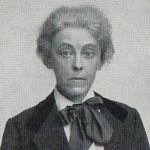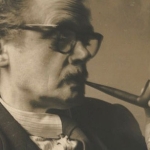The town is old and very steep
A place of bells and cloisters and grey towers,
And black-clad people walking in their sleep—
A nun, a priest, a woman taking flowers
To her new grave; and watched from end to end
By the great Church above, through the still hours:
But in the morning and the early dark
The children wake to dart from doors and call
Down the wide, crooked street, where, at the bend,
Before it climbs up to the park,
Ken’s is in the gabled house facing the Castle wall.
When first I came upon him there
Suddenly, on the half-lit stair,
I think I hardly found a trace
Of likeness to a human face
In his. And I said then
If in His image god made men,
Some other must have made poor Ken—
But for his eyes which looked at you
As two red, wounded stars might do.
He scarcely spoke, you scarcely heard,
His voice broke off in little jars
To tears sometimes. An uncouth bird
He seemed as he ploughed up the street,
Groping, with knarred, high-lifted feet
And arms thrust out as if to beat
Always against a threat of bars.
And oftener than not there’d be
A child just higher than his knee
Trotting beside him. Through his dim
Long twilight this, at least, shone clear,
That all the children and the deer,
Whom every day he went to see
Out in the park, belonged to him.
“God help the folk that next him sits
He fidgets so, with his poor wits,”
The neighbours said on Sunday nights
When he would go to Church to “see the lights!”
Although for these he used to fix
His eyes upon a crucifix
In a dark corner, staring on
Till everybody else had gone.
And sometimes, in his evil fits,
You could not move him from his chair—
You did not look at him as he sat there,
Biting his rosary to bits.
While pointing to the Christ he tried to say,
“Take it away”.
Nothing was dead:
He said “a bird” if he picked up a broken wing,
A perished leaf or any such thing
Was just “a rose”; and once when I had said
He must not stand and knock there any more,
He left a twig on the mat outside my door.
Not long ago
The last thrush stiffened in the snow,
While black against a sullen sky
The sighing pines stood by.
But now the wind has left our rattled pane
To flutter the hedge-sparrow’s wing,
The birches in the wood are red again
And only yesterday
The larks went up a little way to sing
What lovers say
Who loiter in the lanes to-day;
The buds begin to talk of May
With learned rooks on city trees,
And if God please
With all of these
We, too, shall see another spring.
But in that red brick barn upon the hill
I wonder—can one own the deer,
And does one walk with children still
As one did here?
Do roses grow
Beneath those twenty windows in a row—
And if some night
When you have not seen any light
They cannot move you from your chair
What happens there?
I do not know.
So, when they took
Ken to that place, I did not look
After he called and turned on me
His eyes. These I shall see—













Comment form: